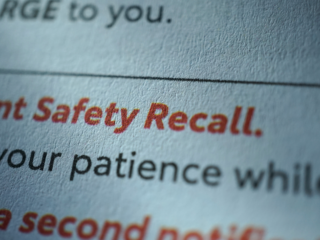Imagine you are on an afternoon drive. You are obeying the rules of the road and driving in a safe and prudent manner. Suddenly, another vehicle comes along, blows through a clearly-marked stop sign and smashes into your vehicle. You are now injured and faced with a lifetime of pain through no fault of your own. Your first thought is to sue the at-fault driver. However, there is just one problem: you didn’t have a valid driver’s license at the time of the crash.
Are you able to bring a lawsuit against the negligent driver who caused your injuries? The answer is a rather complicated one.
Under subsection 267.6(1) of the Ontario Insurance Act, a person does not have a right to sue for injuries sustained in a car accident if they were contravening subsection 2(1) of the Compulsory Automobile Insurance Act (”CAIA”) at the time:
No action by uninsured owner or lessee
267.6 (1) Despite any other Act, a person is not entitled in an action in Ontario to recover any loss or damage from bodily injury or death arising directly or indirectly from the use or operation of an automobile if, at the time of the incident, the person was contravening subsection 2 (1) of the Compulsory Automobile Insurance Act in respect of that automobile.
Subsection 2(1) of the CAIA states:
Compulsory automobile insurance
2(1) Subject to the regulations, no owner or lessee of a motor vehicle shall,
(a) operate the motor vehicle; or
(b) cause or permit the motor vehicle to be operated,
on a highway unless the motor vehicle is insured under a contract of automobile insurance.
In short, if you didn’t have a valid automobile insurance policy at the time of the collision, you can’t sue. In order to obtain and be covered by a valid automobile insurance policy, the driver of the vehicle at the time of loss must have had a valid driver’s license.
It becomes less obvious if you can sue when the actual ownership of the vehicle is uncertain.
In the Superior Court of Ontario decision of Mailloux v Mindorf, 2016 ONSC 6003, the plaintiff’s license was expired at the time of the collision. His wife was the registered lessee of the truck. She testified that she was unsure of her husband’s license status at the time of loss. She consented to allowing him to drive the vehicle for work. The defence argued that the truck was only in the wife’s name because the husband was unlicensed and uninsured, and that in reality, he was the true owner of the vehicle. The defence moved for summary judgement to dismiss the plaintiff’s claim.
In his decision, Rady J. noted that the term “owner” isn’t described in the applicable legislation and that the common law does not restrict ownership just to the registered owner of the vehicle. To do so would bestow the rights of common law ownership on an individual but allow them to avoid all of the responsibilities associated with said ownership.
Rady J went on to note that Statutory Condition 4(1) requires a driver of the insured vehicle to have a valid driver’s license and not one that is expired, suspended, or cancelled:
Authority to drive
4. (1) The insured shall not drive or operate or permit any other person to drive or operate the automobile unless the insured or other person is authorized by law to drive or operate it.
An automobile insurance policy is a contract between the insurance company and the insured person. There are certain requirements in every Ontario automobile insurance policy, called “Statutory Conditions” that must be met by the insured person to keep the policy in effect. A breach of a Statutory Condition by the insured person may result in the insurance policy being deemed “void ab initio” (i.e. void from the very beginning).
Another Statutory Condition requires the insured to promptly notify the insurance company of any “material change in risk”. This includes a requirement to advise the insurer of who will be driving the vehicle and their license status.
Therefore, if an insured person drives or allows the vehicle to be driven by a person without a license, then the automobile insurance policy may be voided from the outset. If the policy is voided, then there is no insurance. If there was no insurance, then the owner of the vehicle was in violation of subsection 2(1) CAIA and the injured driver can’t sue.
Importantly, Rady J. also found that the husband was the real lessee of the vehicle, as title was only taken in the wife’s name because the husband did not have a license or insurance. The lease agreement was a sham designed to circumvent the husband’s ineligibility. As such, the plaintiff husband was in breach of the CAIA and could not recover damages pursuant to section 267.6 of the Insurance Act.
The court also found that the wife was in breach of Statutory Conditions by allowing her husband to drive the truck without a license, and for failing to advise her insurance company of this. This rendered the insurance contract void ab initio. As such, even if the wife was found to be the owner of the vehicle, there was still no valid policy of insurance in place at the time of loss, thus violating section 2(1) of the CAIA and section 267.6 of the Insurance Act.
If you are suing your own insurance company since the at-fault driver did not have a valid insurance policy, there are additional considerations that must be taken into account – see Bruinsma v Cresswell, 2013 ONCA 111. Another important consideration is if the injured driver was listed as an excluded driver on the insurance policy, for if s/he was, there may be no insurance coverage for that person at the time of loss.
It is therefore important to always ensure that you and those driving your vehicle have a valid driver’s license and that there is a valid automobile insurance policy in place. Failure to do so can result not only in charges and fines, but an inability to sue for damages for personal injuries caused by a negligent driver even if you weren’t at fault. Also keep in mind that even if you weren’t the registered owner of the vehicle, in certain circumstances the court may find that you were and if you didn’t have a license, you are still barred from suing.
As you can see, insurance coverage issues can be complicated to sort out, and the consequences when coverage is denied can be severe. It’s always a good idea to speak with a local personal injury lawyer to understand your rights in these situations.














